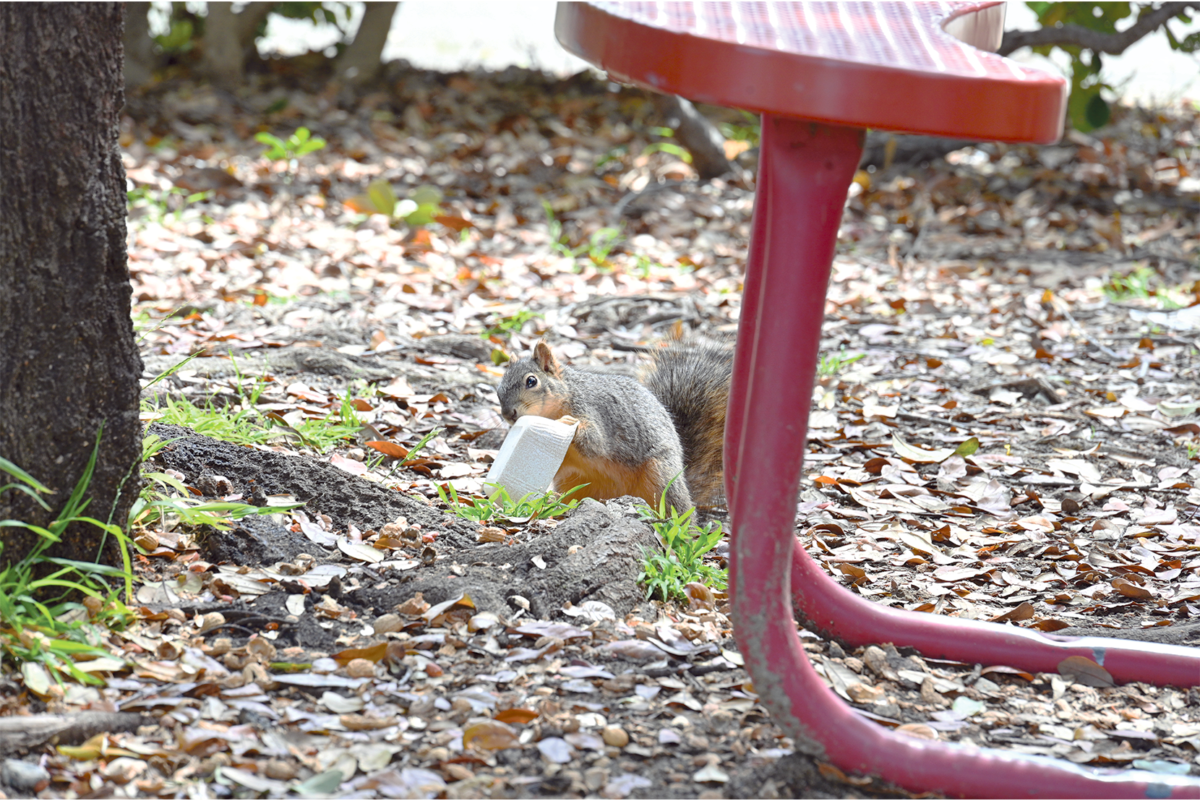The abridged version of this article appeared in the June 2023 print edition of The Mirror. This is an uncut version.
A staggering population of squirrels call the campus home, a phenomenon that can be traced back to a single cause.
Trash.
From wasted cafeteria food, campus litter or crumbs from crushed Doritos, this trash keeps the campus squirrels well fed and populous. Custodian Mr. Orlando Gardea is weary after dealing with students who have the habit of not cleaning up after themselves.
“It’s generally the trash which makes it really tiring,” he said. “These kids, they’ll have a trash can next to them and they won’t use it, so that takes up a lot of my time.”
The squirrel community at Van Nuys High School has won the heart of Mr. Gardea. Initially, he fed them peanuts, later switching to sunflower seeds due to concerns about student peanut allergies.
Despite the significant squirrel population on campus, Mr. Gardea doesn’t think they’re a threat to anyone.
“They don’t do any harm, the only thing they do that’s bad is take trash out of the can and move it,” he said. “There’s more trash laying around and I have to clean it.”
Nevertheless, the trash students leave behind presents a far greater burden for Gardea than any mess made by squirrels. The issue has been exacerbated by an increase in student waste, which in turn has exacerbated the troubles caused by squirrels.
The students’ actions, however unintentional, have a detrimental impact. Their littering, often a result of sheer laziness to locate the nearest trash bin, undoes the painstaking efforts invested in maintaining the campus’s beauty.
“There is a lot of littering, and I find it very sad because we have a beautiful campus,” senior Eliza Khodar said.
Littering indeed remains a significant issue that extends far beyond school grounds and infiltrates many public spaces. Often, it stems from an absence of personal responsibility, with individuals expecting custodians like Mr. Gardea to manage their discarded items.
Senior Raina Marangattu acknowledges that she has noticed litter scattered around the campus. Yet, she, along with others, often bypasses it rather than actively cleaning up. She recognizes this as an instance of the tragedy of the commons, a scenario where communal resources are misused as they don’t clash with individuals’ immediate responsibilities. With the constant bustle of classes and lunch lines, students find it easy to overlook the litter issue.
Nevertheless, Marangattu affirms that the school is actively addressing the problem. Detention programs involving trash pickup serve as proof of this proactive approach.
Among these initiatives is the Saturday Clean Up event, where students give up their Saturday mornings to tidy the campus. This annual event has successfully curbed littering and fostered a more accountable school community. It’s part of the School-Based Management (SBM) program, which maintains a disciplinary committee that sets incentives and penalties for students infringing school policies, including tardiness.
An hour of participation in this cleanup event can substitute for one detention. Students with multiple detentions can continue attending until their obligations are fulfilled. These cleanup sessions commence in the lecture hall with a discussion about the importance of punctuality and the effects of littering on campus, followed by litter collection and tasks like moving library boxes. Deans supervise the students to ensure safe and productive participation.
While custodians handle the majority of campus cleaning during weekdays, there are ongoing instances of staff shortages. During these cleanup events, students can assist with tasks ordinarily performed by the custodial team.
The troubling litter issue on campus extends beyond the visible trash, hinting at a deeper concern: students’ lack of respect and school ownership, according to AP science teacher Tracey Kim.
“There are students in the hallways who throw trash around because they’re immature,” she said. “When some teachers leave their classroom doors open, some kids actually knock over the trash cans in them.”
The reasons behind such actions vary. A crude sense of humor might be the motivator for some, while for others, it’s plain rudeness. This disrespect for school property is deeply concerning, and Ms. Kim questions whether the source of the problem might stem from the students’ home environments.
“I wonder if the parents are disciplining their children for misbehavior,” Ms. Kim said. “It may not be something popular to talk about, but I think what goes on at home definitely plays a role in students’ disrespectful behavior.”
Boosting school spirit and providing incentives for campus care could counteract this lack of respect, Ms. Kim suggests. One idea is a campus beautification project, such as tree planting. The possibility of earning community service hours, she believes, might encourage active student participation.
But altering students’ attitudes and behaviors isn’t an overnight process. It will take time, persistence and a focus on more than just punishment for littering. Fostering a sense of school pride and encouraging students to take responsibility for their actions should be at the heart of this movement.
“If we could try to change our students’ mindset, and have them appreciate where they are getting educated for the next four years, then maybe we might see some change,” Ms. Kim said. “I think it’s not about punishing them even though that’s still important, we should try providing some sort of incentive and see if that’ll be effective.”
Addressing the issue of campus litter extends beyond maintaining cleanliness and aesthetics. It reflects on students’ attitudes toward their school and their environment. Promoting school spirit and providing incentives for responsible behavior can help instill a sense of respect and ownership among students. There is hope that this approach can create a healthier, more appealing environment, benefitting not just the resident squirrels, but all members of the campus community.
But what steps can students take to mitigate these issues? The most important action is to take responsibility for their own messes. Rather than depending on custodians, students should make sure to dispose of their waste appropriately, utilizing trash cans and recycling bins instead of discarding garbage haphazardly.
Another key consideration is the understanding that squirrels are wild animals, not domesticated pets. The urge to feed them might be strong, but doing so could lead to problems such as dependency, aggression and the spread of diseases. The best course of action is to respect their space and allow them to live without human interference.
At first glance, the presence of squirrels and litter on campus might seem like minor issues. However, they are an indication of a larger concern – the apparent absence of personal responsibility among students. By taking charge of their actions and showing respect for the wildlife around them, students can contribute to a cleaner, safer and more pleasant campus for everyone.



